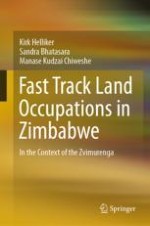
2021 | OriginalPaper | Buchkapitel
1. Zvimurenga Reflections
verfasst von : Kirk Helliker, Sandra Bhatasara, Manase Kudzai Chiweshe
Erschienen in: Fast Track Land Occupations in Zimbabwe
Aktivieren Sie unsere intelligente Suche, um passende Fachinhalte oder Patente zu finden.
Wählen Sie Textabschnitte aus um mit Künstlicher Intelligenz passenden Patente zu finden. powered by
Markieren Sie Textabschnitte, um KI-gestützt weitere passende Inhalte zu finden. powered by